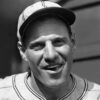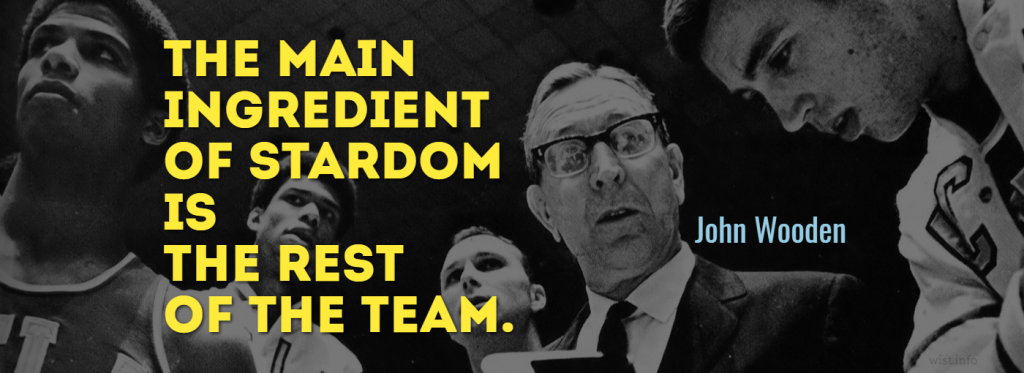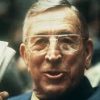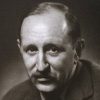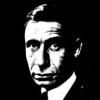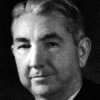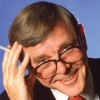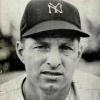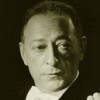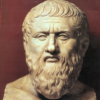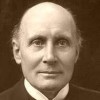Let others, then, have their weapons, their horses and their spears, their fencing-foils, and games of ball, their swimming contests and foot-races, and out of many sports leave us old fellows our dice and knuckle-bones. Or take away the dice-box, too, if you will, since old age can be happy without it.
[Sibi habeant igitur arma, sibi equos, sibi hastas, sibi clavam et pilam, sibi natationes atque cursus; nobis senibus ex lusionibus multis talos relinquant et tesseras; id ipsum ut lubebit, quoniam sine eis beata esse senectus potest.]
Marcus Tullius Cicero (106-43 BC) Roman orator, statesman, philosopher
De Senectute [Cato Maior; On Old Age], ch. 16 / sec. 58 (16.58) (44 BC) [tr. Falconer (1923)]
(Source)
The actual gaming objects for old folk that Cicero refers to were the talus (a long four-sided die) and the tessera (a six-sided die). Various games were played rolling these, on their own or together.
(Source (Latin)). Alternate translations:
Yong men have for them for theyr solas & worship, their armours, their horsys, their speris, pollaxis mallys, and Instrumentys of iren, or of leed, and launcegayes for to fyght. And also maryners in vsyng the see and yong men deliten in shippys bargys of dyvers fassions and in rowynges and in sayllyng in watirs and ryvers and in the sees, and som yong men usen the cours of voyages in gooyng rydyng and iourneyeng from one counttre to anothir, and emong many othir labours of playes sportys and of dyvers solacys. The yong men also levyn to the use of olde men the playe at the tablis and chesse and the philosophers playe by nombre of arsmetrike as is made mencion in the boke of O∣vide de vetula callid the reformacion of his life. But we demaunde the Caton, if the olde men may goodly use and when we be olde of thies two said playes of the tablis and chesse, I answere you nay, for withoute thies two playes ol̄de age may wele be stuffid and fulfillyd of alle othir goodnes perteynyng to felicite and to blessidnesse. Now it is so that olde age and yche othir age usyng of discression ought not to doo any thyng, but that it drawe and be longe to vertues and to blessidnesse in stede of playes at tables and at chesses.
[tr. Worcester/Worcester/Scrope (1481)]
Let us therefore bid adieu to all such youthly pranks and exercises as lusty and green-headed gallants, agitated and pricked with the fervent heat of unadvised adolescence, do enure themselves withal: God speed them well with their usual disports and dalliance; let them take to themselves their armour, weapons, and artillery; let us permit and give them good leave to daunt fierce horses and with spears in rest to mount on courageous coursers; let them handle the pike, toss the javelin and club daily, and play at the tennis, exercise themselves with running, swimming, and such-like deeds of activity and nimbleness. To us old men among all their other games and pastimes, let them leave the tables, the chance-bone or dice, and the chess, which without any danger or sore straining of the body may be practiced. And yet I will not seem to allow these last-named games further than every man himself is disposed, because they be not necessary, and old age may without them be blessed and fortunate.
[tr. Newton (1569)]
Therefore young men have their weapons, their horses, their speares, their swimming, the ball, the club, and their races, and they leave to us old men the cards and the tables which we sometimes use when we list; for age may be right happy without them.
[tr. Austin (1648)]
Let those of younger Years take to themselves all the Diversions of their several sorts of Gaming, Fencing, Racing, or Bathing can afford them: leave us to our Chesse-boards, and our Tables; and yet we are not solicitous even for those, since the Happiness of old Age does not depend on them.
[tr. Hemming (1716)]
Let therefore the young have their Arms, Horse, Spears, Lances, Balls, Baths, and Races; and of their many Diversions, leave to us the Cards and the Tables, to make use of just when we please; for Old Age can be happy without them.
[tr. J. D. (1744)]
To others therefore we can freely resign all other Diversions, in Arms and Horses, with their military Exercises, and all their Accoutrements, their Tennis, and every other Sport; only, if they please, they may leave us Checquers and Tables; or even these also we can give up; since Old Age can be very easy and very happy without any such trifling Amusements.
[tr. Logan (1744)]
In respect to the peculiar articles of rural diversions, let those of a more firm and vigorous age enjoy the robust sports which are suitable to that season of life; let them exert their manly strength and address in darting the javelin, or contending in the race; in wielding the bat, or throwing the ball; in riding, or in swimming; but let them, out of the abundance of their many other recreations, resign to us old fellows the sedentary games of chance. Yet if they think proper even in these to reserve to themselves an exckisive right, I shall not controvert their claim; they are amusements by no means essential to a philosophic old age.
[tr. Melmoth (1773)]
Therefore let them keep to themselves their arms, horses, spears, cudgel, ball, swimming, and running; and let them leave to us old men, out of so many sports, our astragals and dice; and that very thing whether it shall be to our mind, since old age can be happy without these things.
[Cornish Bros. ed. (1847)]
Let the young, therefore, keep to themselves their arms, horses, spears, clubs, tennis-ball, swimmings, and races: to us old men let them leave out of many amusements the tali and tessera; and even in that matter it may be as they please, since old age can be happy without these amusements.
[tr. Edmonds (1874)]
Let others take for their own delight arms, horses, spears, clubs, balls, swimming-bouts, and foot-races. From their many diversions let them leave for us old men knuckle-bones and dice. Either will serve our turn; but without them old age can hardly be contented.
[tr. Peabody (1884)]
Let the young keep their arms then to themselves, their horses, spears, their foils and ball, their swimming baths and running path. To us old men let them, out of the many forms of sport, leave dice and counters; but even that as they choose, since old age can be quite happy without them.
[tr. Shuckburgh (1895)]
Let who will keep their arms, their steeds, their spears,
Their club and ball, and let them swim and run,
But let them leave from many forms of sport
The dice to us old men, or take them too
If so they will: old age can do without
These trifles, and enjoy full happiness.
[tr. Allison (1916)]
No, let young people keep their equipment, their horses, their spears, their foils, their ball-games, their swimming and running, and out of all their amusements let them leave to us old fellows just the knuckle-bones and dice -- and then only if it strikes their fancy, for old age can be quite happy without them.
[tr. Copley (1967)]
You won't find us [old men] in armor or on horseback throwing spears; we don't fence with sticks or play catch; we'll let other people compete with each other in running or swimming races. Maybe we'll gamble a little with dice or knucklebones, or maybe not -- but, in any case, we'll be perfectly content.
[tr. Cobbold (2012)]
Therefore let others keep their fast cars, speed boats, fitness centers, bats, rackets, and balls, and leave us our checkers and bridge cards. But you know, they can take those too if we have a nice garden.
[tr. Gerberding (2014)]
Let the young have arm and mount
Let them have ball and stick and pike
Let them swim and scurry too,
To the old are paramount
Only dice games and the like.
Should they deem those games undue
We’ll comply without ado.
[tr. Bozzi (2015)]
Let others have their weapons, their horses, their spears and fencing foils, their balls, their swimming contests and food traces. Just leave old men like me our dice and knucklebones. Or take away those too if you want. Old age can be happy without them.
[tr. Freeman (2016)]
Let others have weapons, horses, spears, fencing-foils, ball games, swimming competitions, races, and leave to the old men dice and knucklebones for games. Or let that go too since old age can be happy without it.
[tr. @sentantiq (2018)]
Quotations about:
sports
Note not all quotations have been tagged, so Search may find additional quotes on this topic.
Competition provides spice in life as well as in sports; it’s only when the spice becomes the entire diet that the player gets sick.
George Leonard (1923-2010) American writer, editor, and educator
Mastery: The Keys to Success and Long-Term Fulfillment (1991)
(Source)
Nice guys finish last.
Leo Durocher (1905-1991) American professional baseball player, manager, coach ["Leo the Lip"]
(Paraphrase)
The full quote was reported by in the column by Frank Graham, "Leo Doesn't Like Nice Guys," New York Journal-American (6 Jul 1946). When, as Brooklyn Dodgers manager, asked by a reporter if he were a nice guy:
Nice guys! Look over there. Do you know a nicer guy than Mel Ott? Or any of the other Giants? Why they’re the nicest guys in the world! And where are they? In seventh place! The nice guys over there are in seventh place. Well let them come and get me. The nice guys are all over there. In seventh place.
As the anecdote was retold (even when Graham's column was reprinted in Baseball Digest in the fall of that year), the references to "seventh place" began morphing into "last place" and "in the second division," eventually settling on the shorter version cited above. While Durocher originally denied he'd said the shorter version, he eventually lay claim to it, and used it as the title of his 1975 autobiography.
More discussion of this quotation:
When a man wantonly destroys one of the works of man we call him Vandal. When he wantonly destroys one of the works of God we call him Sportsman.
Joseph Wood Krutch (1893-1970) American educator, writer, critic, naturalist
The Great Chain of Life, ch. 9 “Reverence for Life” (1956)
(Source)
Often misquoted as "a vandal ... a sportsman."
Sport strips away personality, letting the white bone of character shine through. Sport gives players an opportunity to know and test themselves.
Coaches and headmasters praise sport as a preparation for the great game of life, but this is absurd. Nothing could be more different from life. For one thing sports, unlike life, are played according to rules. Indeed, the rules are the sport: life may behave bizarrely and still be life, but if the runner circles the bases clockwise it’s no longer baseball.
The main ingredient of stardom is the rest of the team.
John Wooden (1910-2010) American basketball player and coach
They Call Me Coach, ch. 25, epigraph (1972)
(Source)
Anybody who teaches a skill, which coaches do, is admirable. But sport doesn’t build character. Character is built pretty much by the time you’re six or seven. Sports reveals character. Sports heightens your perceptions. Let that be enough.
Heywood Hale Broun (1918-2001) American author, sportswriter, actor
In Ames Daily Tribune (16 Jan 1974)
Broun used a number of variations of this idea. It was more famously paraphrased in James Michener, Sports in America (1976), as "Sports do not build character. They reveal it." More discussion on this quote here.
One of the things that I noticed in war was how difficult it was for our soldiers, at first, to realize that there are no rules to war. Our men were raised in sports, where a referee runs a football game, or an umpire a baseball game, and so forth.
I am convinced that every boy, in his heart, would rather steal second base than an automobile.
Tom C. Clark (1899-1977) American lawyer, US Attorney General, US Supreme Court Justice (1949-1967)
(Attributed)
Speaking of recreational programs to reduce juvenile delinquency. Quoted in Reader's Digest, Vol. 60 (1952). Restated as "I still believe that any boy would rather steal second base than an automobile" in Washington World, Vol. 3 (1963).
Catching a fly ball is a pleasure, but knowing what to do with it is a business.
Tommy Henrich (1913-2009) American baseball player [a/k/a "The Clutch" and "Old Reliable"]
In Peter Golenbock, Dynasty: The New York Yankees, 1949-1964, “1949” (1975)
(Source)
Can you appreciate music without playing it? Of course you can, in the same way that people who are not athletes get enjoyment from attending a game to enjoy the crowd, the excitement, and the experience.
Jascha Heifetz (1901-1987) Lithuanian-American violinist
(Unsourced)
Quoted on his official web page.
The important thing in life is not the victory but the contest; the essential thing is not to have won but to have fought well.
[L’important dans la vie ce n’est point le triomphe, mais le combat, l’essentiel ce n’est pas d’avoir vaincu mais de s’être bien battu.]
Pierre Frédy, Baron de Coubertin (1863-1937) French pedagogue, historian, founder of the International Olympic Committee
Olympic Creed, Speech, Olympic Games, London (24 Jul 1908)
Alt. trans: "The important thing in life is not the triumph but the struggle, the essential thing is not to have conquered but to have fought well."
Original phrasing by de Coubertin: "The importance of these Olympiads is not so much to win as to take part."
De Coubertin was drawing from a sermon by Bp. Ethelbert Talbot at St Paul's Cathedral, London (19 Jul 1908): "We have just been contemplating the great Olympic Games. What does it mean? It means that young men of robust physical life have come from all parts of the world. It does mean, I think, as someone has said, that this era of internationalism as seen in the Stadium has an element of danger. Of course, it is very true, as he says, that each athlete strives not only for the sake of sport, but for the sake of his country. Thus a new rivalry is invented. If England be beaten on the river, or America outdistanced on the racing path, or that American has lost the strength which she once possessed. Well, what of it? The only safety after all lies in the lesson of the real Olympia -- that the Games themselves are better than the race and the prize. St. Paul tells us how insignificant is the prize, Our prize is not corruptible, but incorruptible, and though only one may wear the laurel wreath, all may share the equal joy of the contest. All encouragement, therefore, be given to the exhilarating -- I might also say soul-saving -- interest that comes in active and fair and clean athletic sports."
No member of a crew is praised for the rugged individuality of his rowing.
Alfred North Whitehead (1861-1947) English mathematician and philosopher
“Harvard: The Future,” sec. 5, The Atlantic Monthly (Sep 1936)
(Source)
Reprinted in Essays in Science and Philosophy, Part 3 (1947). Often misattributed to Ralph Waldo Emerson.
If you don’t play to win, why bother to keep score?
Adolph Rupp (1901-1977) American college basketball coach
Comment (11 Jun 1958)
Rupp frequently returned to this phrase, usually in response to someone quoting to him from Grantland Rice's "Alumnus Football" (paraphrased, "It doesn't matter whether you win or lose, but how you play the game").
Variations:
Rupp wasn't necessarily the originator of this thought. Clair Bee, another US college basketball coach, said during the CCNY Point Shaving Scandal that ended his career, "If the kids aren't playing for keeps, why keep score?" (20 Feb 1951).
- "If it doesn't matter who wins or loses, then what in the hell is that scoreboard doing up there?"
- "If it doesn't matter, then why does every school have a scoreboard? If it doesn't matter who wins why do 25,000 football fans follow a team 400 miles and sit in eight inches of snow to watch the game?" [Source]
- "If winning isn't so important, why do they keep score?" [Source]
Sometimes attributed to Vince Lombardi.
More discussion of this quotation: The Big Apple: “If winning isn’t important, why keep score?”



